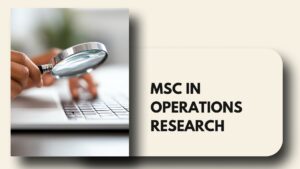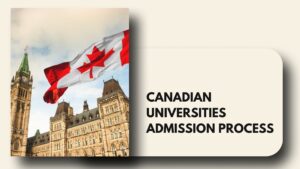- Master’s in Psychology in Canada is a 1-2 years degree programme focusing on mental health disorders, patient behaviour, and workplace effectiveness improvement
- Clinical psychologists in Canada earn between CAD 100,000-112,000 (₹63.3-70.9L) per year, diagnosing and treating mental illnesses through therapy
- Annual tuition fees for psychology master’s programmes range from CAD 8,874 to CAD 13,330 (₹5.6L-8.4L) across leading Canadian institutions
- Is a Master’s in Psychology in Canada worth it?
- Top Universities for Master’s in Psychology in Canada
- Syllabus for Master’s in Psychology in Canada
- Entry Requirements for Master’s in Psychology in Canada
- How to Apply for a Master’s in Psychology in Canada
- Career Opportunities after Master’s in Psychology in Canad
- Scholarships for Master’s in Psychology in Canada for Indian Students
- Your Journey to a Psychology Career in Canada Starts Here
- FAQs

Psychology plays an integral role in conflating our thoughts and actions. The study of psychology helps us understand mental illness and stress and ensure a healthy lifestyle. Master’s in Psychology in Canada is a 1-2 years degree program that whets your skill in understanding patient’s behaviour, improving workplace effectiveness, diagnosing mental health disorders and improving lifestyles of patients, clients and employees.
Is a Master’s in Psychology in Canada worth it?
A Master’s in Psychology in Canada allows students to navigate roles in healthcare institutions, international organisations, and private and public sectors. The specialisation program strengthens students’ knowledge in understanding psychological disorders, behaviours of patients, etc.
A psychologist/psychiatrist ensures the building of positive behaviours, improving emotional intelligence, and strengthening interpersonal relationships. The degree offers diversified career options like counselling, research, teaching, psychiatry, etc.
In recent years, Canada has witnessed a jump resulting in to immigration of Indian students dreaming of pursuing their master’s in Canada. Every year more than 3.20 lakh Indian students are migrating to Canada for their higher studies, research and job opportunities. Developed research infrastructure, education system, dissertations and seminars are contributed in increasing the number of international students.
Top Universities for Master’s in Psychology in Canada
Some of the top universities for pursuing Master’s in Psychology are listed below:
| University | Course Name | QS Subject Ranking 2025 (Psychology) | Duration | Annual Tuition Fee (CAD/INR) |
|---|---|---|---|---|
| University of British Columbia | MA in Psychology | 19 | 2 years | $9,883 (₹6.2L) |
| University of Calgary | MSc in Psychology | 150 | 2 years | $13,330 (₹8.4L) |
| Western University | MSc in Psychology | 150 | 2 years | $9,801 (₹6.2L) |
| University of Alberta | MA in Psychology MSc in Psychology | NA | 2 years | $8,874 (₹5.6L) |
Syllabus for Master’s in Psychology in Canada
The syllabus for Master’s in Psychology in Canada includes 2 modules: core & elective. The core modules are the mandatory subjects, while the elective modules refer to the subjects taught along with the core subjects. Some universities also offer dissertation periods to students.
Core Modules
These include subjects that are compulsory for students.
- Critical, Comprehensive & Creative Research Methodologies
- Psychology in Clinical Practice
- Critical, Comprehensive & Creative Research Analysis
- Health & Society
- Professional Issues
- Mind & Body
- Health Behaviour Change
- Illness & Health Care
- Psychology in Clinical Practice
- Principles of Positive Psychology
- Capstone in Positive Psychology
- Applications of Positive Psychology
Elective Modules
This refers to subjects that are taught along with core subjects. Students can choose these subjects depending on their interests.
- Psychobiology of Cognition
- Neurocognitive Disorder
- Stress, Fear & Anxiety
- Wellbeing & Resilience
- Innovation & Psychological Assessment
Entry Requirements for Master’s in Psychology in Canada
- Educational Background: A bachelor’s honours degree in science/engineering discipline. Some universities also look for one year of work experience as a part of their admission process.
- Language Proficiency Test: A score of 7.0 in IELTS is favourable for admission. In PTE, students require a minimum score of 76 or above; in TOEFL iBT, an overall score of 96 or above is considered decent for admission. The sub-score required for TOEFL iBT/IELTS varies from university to university.
How to Apply for a Master’s in Psychology in Canada
- Application Form: Candidates must fill out the application forms of their desired universities.
- Academic Transcripts: This includes 10th and 12th marksheets. Universities also need a bachelor’s degree certificate and marksheet for admission.
- Language Proficiency Test score: The IELTS/TOEFL/PTE test scores are required as part of the admission process.
- LORs & SOP: LORs & SOP play an important role in admission. 2-3 letters of recommendation & one SOP are required for getting into your dream university. Universities that are not asking for SOP might ask for a statement of objective/personal statement. Refer to our free SOP service to boost your application.
- Passport: A passport is also an important document required during admission.
Career Opportunities after Master’s in Psychology in Canad
A Master’s in Psychology in Canada prepares you for roles like counsellor, psychiatrist, psychologist, researcher, etc.
- Counsellor: There are various kinds of counsellors: school counsellors, career rehabilitation counsellors, crisis counsellors, and mental health counsellors. The role of a counsellor depends on the area of expertise & their work setting. They assist patients in managing stress, provide career guidance, and support students in their academic, social & emotional development. Counsellors in Canada earn an average of CAD 82,000-98,000 per year.
- Clinical Psychologists: They help in assessing, diagnosing, and understanding mental illness & psychological disorders. Skilled & expert psychologists provide this through therapy, counselling & other techniques. The average salary of a clinical psychologist falls from CAD 100,000-112,000 per year.
- Industrial-Organisational Psychologists: They are responsible for understanding employees’ behaviours, improving productivity, and selecting & training employees. They also help in enhancing workplace morale. An Industrial-Organisational psychologist earns CAD 80,000-100,000 per year.
- Forensic Psychologists: They apply psychological knowledge within legal settings, including victims’ & convicts’ mental health & assisting with criminal profiling. An average salary of a forensic psychologist falls from CAD 100,000-108,000 per year.
- Researchers: They help in designing and implementing studies to investigate various psychological disorders & illnesses. This is done by using advanced research methodologies, principles & contemporary theories. Researchers earn an average salary of CAD 78,000-102,000 per year.
| Jobs | Average Annual Salary (CAD/INR) |
|---|---|
| Counsellor | CAD 82,000-98,000 (₹51.9-62.1L) |
| Clinical Psychologists | CAD 100,000-112,000 (₹63.3-70.9L) |
| Industrial-OrganisationalPsychologists | CAD 80,000-100,000 (₹50.6-63.3L) |
| Forensic Psychologists | CAD 100,000-108,000 (₹63.3-68.4L) |
| Researchers | CAD 78,000-102,000 (₹49.4-64.6L) |
Scholarships for Master’s in Psychology in Canada for Indian Students
The scholarships for Master’s in Psychology in Canada for Indian Students are as Founder’s Graduate Scholarship, Mahatma Gandhi World Peace Graduate Scholarship, and many more. The table below gives a detailed idea of the scholarships for Master’s in Psychology.
| University | Scholarships | Amount/Discount |
|---|---|---|
| Founder’s Graduate Scholarship | University of Guelph | CAD 1500/Fee Waiver (INR 95,059) |
| Bacchus Graduate Research Price | University of Alberta | CAD 5000/Fee Waiver (INR 3.1L) |
| Mahatma Gandhi World Peace Graduate Scholarship | University of Alberta | CAD 1100/Fee Waiver (INR 69,709) |
| Dr Patrick Harrigan Graduate Scholarship | University of Waterloo | Not Specified/Fee Waiver |
| UW 50th Anniversary Graduate Scholarship | University of Waterloo | Not Specified/Fee Waiver |
Your Journey to a Psychology Career in Canada Starts Here
Pursuing a Master’s in Psychology in Canada equips you with skills to diagnose mental health disorders, improve workplace effectiveness, and transform patient lifestyles through evidence-based practice. These programmes span 1-2 years with curricula divided into core modules covering Research Methodologies, Clinical Practice, and Health Behaviour Change, plus elective modules like Neurocognitive Disorders and Psychological Assessment tailored to your interests.
Ready to Begin Your Canadian Psychology Adventure?
At AdmitX, we guide you through every phase from university shortlisting to visa approval and accommodation arrangements in Canada.
We provide support across every stage of your study-abroad journey:
- University Selection Guidance
- SOP Review
- Study-Abroad Document Templates
- Free IELTS Bootcamp Course
- Scholarship Assistance
- Visa Support Services
And much more!
Book your FREE study abroad counselling session with our experts today!
FAQs
Can I pursue a Master's in Psychology in Canada without a psychology undergraduate degree?
Some Canadian universities accept students from related fields like sociology, social work, or neuroscience, though prerequisite courses may be required before admission.
Is GRE required for Master's in Psychology admissions in Canada?
Most Canadian universities do not require GRE scores for psychology master’s programmes.
What is the difference between MA and MSc in Psychology in Canada?
MA focuses on theoretical, clinical, and counselling aspects, whilst MSc emphasises research methodologies, experimental psychology, and scientific investigation approaches.
Can international students work whilst studying for Master's in Psychology in Canada?
Yes, international students can work up to 20 hours weekly during academic terms and full-time during scheduled breaks with valid study permits.
What are the post-graduation work permit (PGWP) options after completing psychology master's in Canada?
Graduates receive up to 3 years PGWP for programmes exceeding 2 years, allowing work experience in Canadian psychology sectors.
Do I need to register with a provincial psychology association to practise in Canada?
Yes, practising psychologists must register with provincial regulatory bodies (e.g., College of Psychologists of Ontario) and complete supervised hours for licensure.
Can I transfer credits from my bachelor's degree towards a Master's in Psychology in Canada?
Generally no, master’s programmes don’t accept undergraduate credit transfers, though prerequisite courses completed elsewhere may satisfy admission requirements if approved.
Which Canadian university ranks highest for psychology programmes globally?
University of British Columbia ranks 19th globally in QS Subject Rankings 2025 for Psychology.
What IELTS score is required for Master's in Psychology in Canadian universities?
A minimum IELTS score of 7.0 overall is required, though specific sub-scores vary by institution.
What is the average salary for clinical psychologists in Canada?
Clinical psychologists in Canada earn between CAD 100,000-112,000 (₹63.3-70.9L) annually on average.
If you are an aspirant looking to study at your dream university, book an appointment with AdmitX today and start your applications early to avail yourself of all the benefits.
















